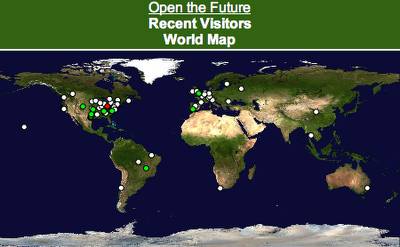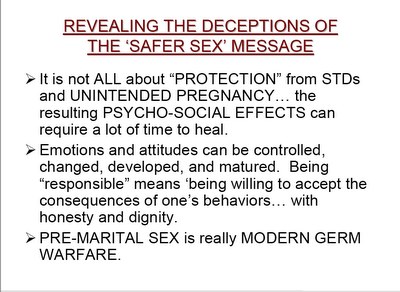Tuesday Topsight, November 21, 2006
 It's a holiday week here in the US, and my posting will be a bit more sporadic than usual. Happy Thanksgiving, US readers...
It's a holiday week here in the US, and my posting will be a bit more sporadic than usual. Happy Thanksgiving, US readers...
• They Came From Around the Planet: Why the repeated references to US visitors? As the map shown at right reveals, it turns out that the people coming to Open the Future visit from nearly every continent (I haven't noticed anyone coming in from Antarctica yet...), and a much greater variety of countries than I expected. I installed Sitemeter to get a better sense of the traffic flows; it's currently only set up to register the front page, so it's not picking up RSS visits or people going directly to interior pages. I'm not really focusing on the raw numbers, though -- what's really given me a charge is the global nature of OtF visitors. Welcome, folks!
• The Origin of Species: Stanford's Fred Turner has written what sounds to be a cool new book, From Counterculture to Cyberculture: Stewart Brand, the Whole Earth Network, and the Rise of Digital Utopianism. As the title suggests, it's the story of Stewart Brand, and his influence from the early days before Whole Earth all the way through GBN to his most recent work with Long Now. RU Sirius (who tends to travel in circles that overlap Brand's) interviews Turner for a terrific article in the webzine 10 Zen Monkeys, and the interaction between Sirius and Turner is delightful. RU Sirius was there for much of what Turner discusses, without being at the focal point -- he's able to offer an insider's-outside-view, mirroring Turner's outsider's-inside-view.
RU: I also think there’s a punk influence in this whole thing that gets ignored. Stylistically, Brand couldn’t be more different than the punk culture. But there’s a direct and important link between Whole Earth and punk culture and that’s DIY — Do It Yourself; start your own institutions, anybody can grab a tool and use it.
FT: Very definitely. And Brand briefly embraced punk in his late-70s magazine, “Co-Evolution Quarterly.” And got a lot of hate mail from his audience.
I met Fred Turner a few years ago, while he was working on the book, and I've been kind of frustrated at how poorly my schedule has lined up with his local appearances now that the book is out. He's actually speaking at GBN in a couple of weeks, in conversation with Stewart, but that event happens on the same night as the WorldChanging event at the Commonwealth Club in SF. I figure I really should go to the WC gig... Update: W00T! GBN changed the night for the Turner conversation, so I can hit it as well as the WorldChanging event.
• At a Loss for Words. Seriously.: Dr. Eric Keroack is the newly-appointed head of the US government's Title X program, the only federal program with a family planning and reproductive health mandate. If that sentence gave you a sick feeling in the pit of your stomach, you're right. Keroack is an abstinence-only crusader, and has actually argued in public that... well, let this frame from his powerpoint make his case:

Modern germ warfare. And those of us in the US pay this man's salary.
• Paradoxical Terror: Political science professor John Mueller asks a provocative question in the pages of the last issue of Foreign Affairs: what if there's no longer any substantive threat from al Qaeda and similar terrorist groups?
A fully credible explanation for the fact that the United States has suffered no terrorist attacks since 9/11 is that the threat posed by homegrown or imported terrorists -- like that presented by Japanese Americans during World War II or by American Communists after it -- has been massively exaggerated. Is it possible that the haystack is essentially free of needles? [...]Intelligence estimates in 2002 held that there were as many as 5,000 al Qaeda terrorists and supporters in the United States. However, a secret FBI report in 2005 wistfully noted that although the bureau had managed to arrest a few bad guys here and there after more than three years of intense and well-funded hunting, it had been unable to identify a single true al Qaeda sleeper cell anywhere in the country.
This is, in effect, the "Fermi's Paradox" argument for terrorism.
Mueller makes some strong points about the meaning of the lack of al Qaeda (or related) activity in the US in the years since 9/11, as well as the lack of evidence of al Qaeda (etc.) groups even existing in the US. And while high-profile events like the bombings in Madrid and London remain seared into our consciousness, the reality is that they are one-off events. Mueller further argues that these high-profile attacks are signs of al Qaeda's (and so forth) weakness, not strength.
I'm not entirely convinced by his overall argument, largely because of the old saw that "absence of evidence is not evidence of absence." Although Mueller is undoubtedly right that no single typical explanation for the lack of subsequent attack is itself valid, it's possible that the combination of factors has some explanatory value. Still, it's clear that AQ (etc.) are nowhere near as pervasive and dangerous as they were described in the months and years following 9/11.
I'd really be interested in John Robb's take on this essay.






Comments
Heh, I love the psychotic use of caps in the Keroack powerpoint. I guess he is nothing like Kerouac.
Posted by: Michael Anissimov | November 21, 2006 7:58 PM